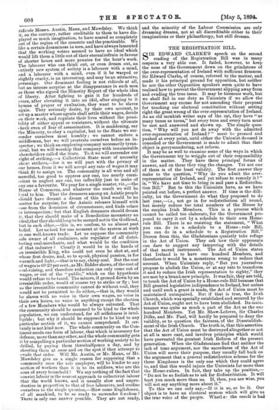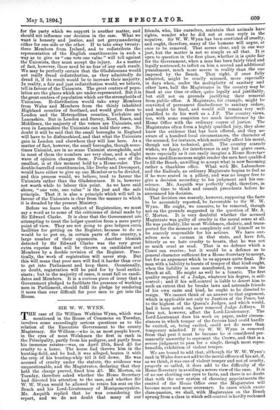THE REGISTRATION BILL.
SIR EDWARD CLARKE'S speech on the second reading of the Registration Bill was in many respects a very able one. It failed, however, to keep the nose of the Government down on the grindstone of the over-representation of Ireland with sufficient firmness. Sir Edward Clarke, of course, referred to the matter, and made it his principal ground for opposition, but neither he nor the other Opposition speakers seem quite to have realised how to prevent the Government slipping away from and evading the true issue. It may be tiresome work, but we shall fail in our duty as Unionists if we allow the Government any excuse for not amending their proposal for touching our electoral constitution without setting right the great wrong of the over-representation of Ireland. As an old monkish writer says of the cat, they have " as many tunes as turns," but every tune and every turn must be met and answered and shown up. The simple ques- tion, " Why will you not do away with the admitted over-representation of Ireland ? " must be pressed and pushed at every point, until either the Unionist demand is conceded or the Government is made to admit that their object is gerrymandering, not reform.
It may be as well to examine some of the ways in which the Government try to wriggle out of their responsibility in the matter. They have three principal forms of answer, and on these they ring the changes. Yet not one of them is of the least validity. The first answer they make to the question, " Why do you admit the over- representation of Ireland, and yet refuse to remedy it ? " is, " We have not time to bring in and pass a Redistribu- tion Bill." But to this the Unionists have, as we have pointed out before, a perfect answer. If time is the diffi- culty, let the Government do what they proposed to do last year,—i.e., not go in for redistribution all round, but merely reduce tne total numbers of the House by the surplus Irish Members. This is a process which cannot be called too elaborate, for the Government pro- posed to carry it out by a schedule to their own Home- rule Bill. There is no resisting the statement, " What you can do in a schedule to a Home - rule Bill, you can do in a schedule to a Registration Bill." Driven from this, the Gladstonians quaintly take refuge in the Act of Union. They ask how their opponents can dare to suggest any tampering with the details of that sacred instrument. The Act of Union states that Ireland is to have one hundred Members, and therefore it would be a monstrous wrong to reduce that amount. When Unionists reply, " But you yourselves propose to abolish the Union, or at any rate to transform it and to reduce the Irish representation to eighty," they are met by a brand-new principle. It was fair, they are told, to touch the Act of Union by a Home-rule Bill because that Bill granted legislative independence to Ireland, but unless and until such a grant is made, the Act of Union must be maintained unimpaired. But if that is true, the Irish Church, which was specially established and secured by the Act of Union, ought not to have been abolished. Its main- tenance was quite as much a part of the Act as the one hundred Members. Yet Mr. Shaw-Lefevre, Sir Charles Dilke, and Mr. Paul, will hardly be prepared to deny the validity, or to question the fairness, of the Disestablish- ment of the Irish Church. The truth is, that this assertion that the Act of Union must be destroyed altogether or not at all is mere cant, and involves principles which would have prevented the greatest Irish Reform of the present generation. When the Gladstonians find that neither the lack of time argument, nor the sacredness of the Act of Union will serve their purpose, they usually fall back on the argument that a general redistribution scheme for the three Kingdoms is the only one which they could agree to, and that this would injure the Unionists far more than the Home-rulers. In fact, they take up the position,- " Do not be so foolish as to ask for Redistribution. It will hurt you much more than us. If, then, you are wise, you will not say anything more about it." To this we can only say,—If it is so, so be it. Our object is to have an electoral system which will give us the true voice of the people. Whette:_the result is bad for the party which we support is another matter, and should not influence our decision in the case. What we want is honesty and justice, and not gerrymandering either for one side or the other. If to take away twenty- three Members from Ireland, and to redistribute the representation of the English constituencies in such a way as to give us " one vote one value " will tell against the Unionists, they must accept the injury. As a matter of fact, however, there need be no fear of any such result. We may be perfectly certain that the Gladstonians would not really dread redistribution, as they admittedly do dread it, if its result would be to increase their majority. In reality, a fair and just redistribution would, we believe, tell in favour of the Unionists. The great centres of popu- lation are the places which are under-represented. But it is the great centres of population which are the strongholds of Unionism. Redistribution would take away Members from Wales and Members from the thinly inhabited Highland counties of Scotland, and would give them to London and the Metropolitan counties, Yorkshire and Lancashire. But in London and Surrey, Kent, Essex, and Middlesex, the majority of the voters are Unionists, and even in Lancashire the Unionists can hold their own. No doubt it will be said that the small boroughs in England will have to be disfranchised, and that what the Unionists gain in London and elsewhere they will lose here. As a matter of fact, however, the small boroughs, though some- times Unionist, are in no sense Unionist strongholds, and in most of them the numbers are very close, and a slight wave of opinion changes them. Pontefract, one of the smallest, is at this moment held by a Home-ruler. The double-barrelled constituencies, like Derby and Devonport, would have either to give up one Member or to be divided, and this process would, we believe, tend to favour the Unionists rather than the Gladstonians. It is, however not worth while to labour this point. As we have said above, " one vote, one value " is the just and the safe principle. That it is also a principle which will tell in favour of the Unionists is clear from the manner in which it is dreaded by the present Ministry.
Before we leave the subject of Registration, we must say a word as to some of the criticisms of detail made by Sir Edward Clarke. It is clear that the Government are attempting to treat the lodger question from a mere party point of view. They are not going to give lodgers extra facilities for getting on the Register, because to do so would be to put on, in certain parts of the country, a large number of their opponents. Another blemish detected by Sir Edward Clarke was the very great extra expense that will be thrown on candidates and Members by a double revision of the Register. Prac- tically, the work of registration will never stop. But this will mean that poor men will find it harder than ever to get into Parliament and keep there. Occasionally, no doubt, registration will be paid for by local enthu- siasts ; but in the majority of cases, it must fall on candi- dates and Members. It is a curious piece of irony that a Government pledged to facilitate the presence of working men in Parliament, should fulfil its pledge by rendering it more than ever difficult for poor men to get into the House.







































 Previous page
Previous page